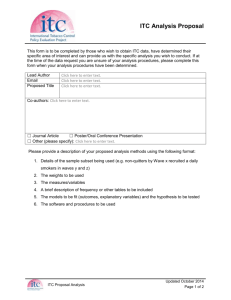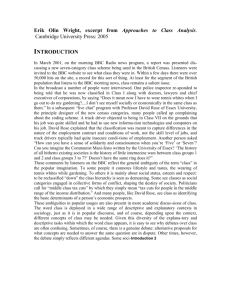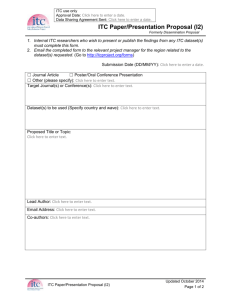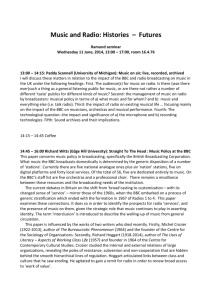ITC ANNOUNCES DECISION ON DIGITAL TERRESTRIAL
advertisement
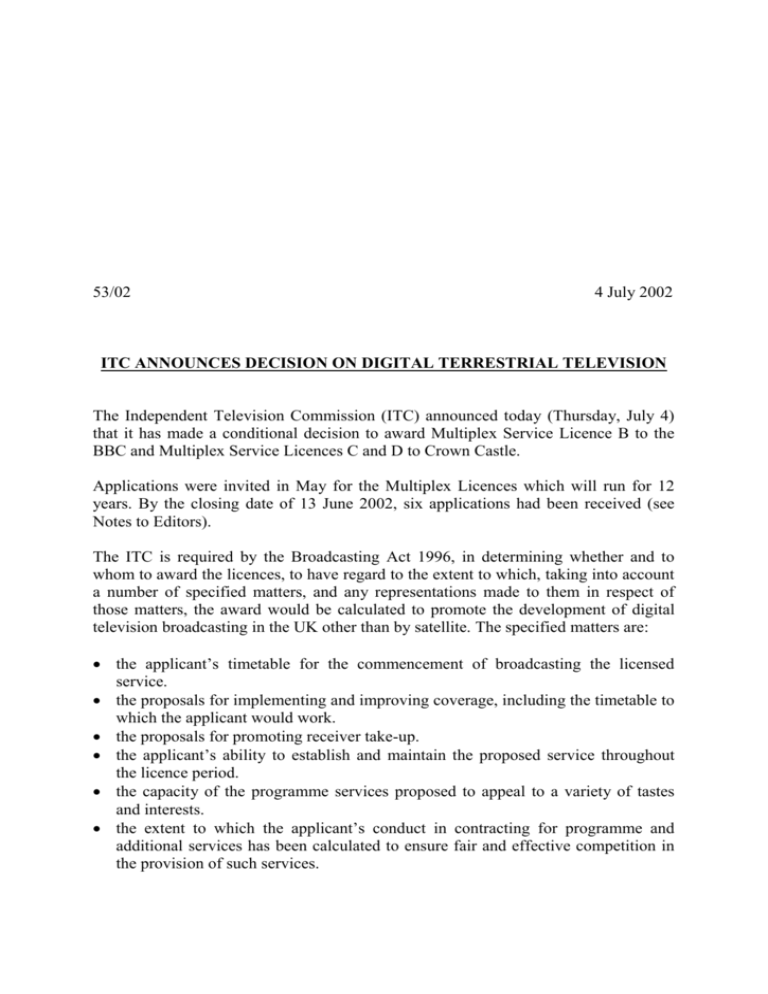
53/02 4 July 2002 ITC ANNOUNCES DECISION ON DIGITAL TERRESTRIAL TELEVISION The Independent Television Commission (ITC) announced today (Thursday, July 4) that it has made a conditional decision to award Multiplex Service Licence B to the BBC and Multiplex Service Licences C and D to Crown Castle. Applications were invited in May for the Multiplex Licences which will run for 12 years. By the closing date of 13 June 2002, six applications had been received (see Notes to Editors). The ITC is required by the Broadcasting Act 1996, in determining whether and to whom to award the licences, to have regard to the extent to which, taking into account a number of specified matters, and any representations made to them in respect of those matters, the award would be calculated to promote the development of digital television broadcasting in the UK other than by satellite. The specified matters are: the applicant’s timetable for the commencement of broadcasting the licensed service. the proposals for implementing and improving coverage, including the timetable to which the applicant would work. the proposals for promoting receiver take-up. the applicant’s ability to establish and maintain the proposed service throughout the licence period. the capacity of the programme services proposed to appeal to a variety of tastes and interests. the extent to which the applicant’s conduct in contracting for programme and additional services has been calculated to ensure fair and effective competition in the provision of such services. -2Applying these requirements, and in accordance with their wider duties under the Broadcasting Act 1990, including that in respect of fair and effective competition, the ITC considered carefully all the applications received but decided that the BBC/Crown Castle applications were best suited to achieving the required objective. The decision by the Commission was based on the following factors: The opportunity provided by the consortium for a fresh start for DTT by offering a distinctive new proposition to consumers. The consortium’s top level resolve to launching and sustaining a service for the duration of the licence. Their approach to addressing technical issues required to improve the performance of the platform. The ambitious and clearly developed marketing strategy for the whole DTT platform. The combination within the consortium of management strength-in-depth of its members and their ability and commitment to deliver the stated proposition and hence promote digital terrestrial television in the UK overall. One special feature of the application was the proposed establishment of “ServicesCo” – comprising the BBC, Crown Castle and BSkyB – to market the platform. The BBC and Crown Castle have undertaken to offer participation to other multiplex operators so that the DTT platform can be marketed as a whole. Both the DTA/Freeview Plus and BBC/Crown Castle bids put forward largely similar free-to-air offerings, although the BBC and Crown Castle proposed slightly more channels in their free-to-air line-up. The Commission also considered the case made in the Freeview Plus application for additionally offering consumers a “pay-lite” channel selection. However, content propositions are only one of the specified matters which the Commission are required to take into account. Another specified matter is the capability of operators to support the long-term development of the platform. The Commission also carefully considered the applications from DTB and SDN against the criteria listed above but concluded that the BBC/Crown Castle bids best fulfilled the requirements. Sir Robin Biggam, Chairman of the ITC, said: “The Commission believes that the BBC/Crown Castle application is the most likely to ensure the viability of digital terrestrial television. It will target those viewers who have not been so far attracted by digital TV and will help facilitate the move towards digital switchover.” The Commission considered very carefully all relevant issues including the possible competition issues and decided that to satisfy any concerns the awards should be subject to the following conditions: -3 Crown Castle must sub-license channel supply on multiplexes C and D on fair, reasonable and non-discriminatory terms. (Should the BBC choose to sub-licence capacity, the same would apply.) BSkyB may supply the three channels named in the application on Multiplex C but may not manage a multiplex. In pursuit of range and diversity, changes in channel line-up will need agreement from the ITC, as will any proposal to introduce pay services. All technical aspects of the transmission roll-out and receiver specification are to be handled through The Digital Network (TDN) - or its successor - to ensure allindustry participation. There will be a non discriminatory requirement for kite marking boxes and it will be clear that technical specifications should not be used to achieve gateway control. We will require the listings information which informs the Electronic Programme Guide (EPG) to conform to open technical standards. This would enable TV manufacturers to design their own presentation of programme listings. The ITC made these awards following a three-week assessment of each application, including the answers to various questions of clarification raised with the applicants, the matters arising out of the public consultation process and formal meetings with each applicant. The Commission considered detailed information about finance, programmes, technology, ownership and competition issues. Of the six bids, five proposed a change to the 16 QAM transmission mode. Consequently, and in order to achieve consistency, the ITC is minded, subject to consultation, to change the technical specification for DTT to 16 QAM in time for the launch of the new services. The award of the licences is subject to the conditions as outlined above. The intention is to proceed to grant by the end of July. Should the conditions not be accepted, the Commission will re-convene to consider the other tenders in the new situation. -4Notes to Editors 1. The six applications received for the multiplex licences are outlined below: Applicant(s) Digital Television Broadcasting Limited (DTB) Digital Terrestrial Alliance (DTA) Freeview Plus SDN Crown Castle Free To View Limited Muxes applied for B, C, D Apax Partners Platform operator model B, C ITV, Channel 4 Application linked with Freeview Plus David Chance, Ian West Pay-lite proposition SDN Platform operator model Crown Castle Application linked with Free-To-View Ltd Free-to-air proposition D B, C, D C, D B Lead Sponsors/ Partners BBC Description 2. In assessing each application, the ITC considered its responsibilities under Section 8(1) and Section 8(2) of the 1996 Broadcasting Act as to the extent to which the award would be calculated to promote digital terrestrial television in the United Kingdom. The criteria are set out in the Act as follows: 8 (1) Where the Commission have published a notice under section 7(1), they shall in determining whether, or to whom, to award the multiplex licence in question, have regard to the extent to which, taking into account the matters specified in subsection (2) and any representations made to them in pursuance of section 7(8)(b) with respect to those matters, the award of the licence to each applicant would be calculated to promote the development of digital television broadcasting in the United Kingdom otherwise than by satellite. 8 (2) The matters referred to in subsection (1) are(a) the extent of the coverage area proposed to be achieved by the applicant as indicated in the technical plan submitted by him under section 7(4)(b), (b) the timetables proposed by the applicant under section 7(4)(b)(ii) and (d), (c) the ability of the applicant to establish the proposed service and to maintain it throughout the period for which the licence will be in force, (d) the capacity of the digital programme services proposed to be included in the service to appeal to a variety of tastes and interests, -5(e) any proposals by the applicant for promoting or assisting the acquisition, by persons in the proposed coverage area of the service, of equipment capable of receiving all the multiplex services available in that area, and (f) whether, in contracting or offering to contract with persons providing digital programme services or digital additional services, the applicant has acted in a manner calculated to ensure fair and effective competition in the provision of such services. 3. The ITC must also take into account representations received on those matters as a result of its public consultation. The ITC made available for public inspection at its offices the non-confidential sections of each application. A statement supplied by each applicant summarising the application was also placed at the ITC’s offices and published on the ITC’s web site. Two hundred and fifty responses were received and taken into account by the ITC in assessing each application. 4. The tables below outline BBC/Crown Castle’s proposed multiplex distribution of channels and additional services across the total platform, which presupposes that there would be a change in transmission mode across all six multiplexes. The specific content and suppliers of these * channels are still to be confirmed. 1 BBC ONE BBC TWO BBC Choice/Cbeebies BBC News 24 BBCi text B BBC Parliament The Community Channel BBC FOUR / CBBC BBCi (interactive) 6 BBC Radio Services 2 ITV 1 ITV 2 Channel 4 spare for C4 Teletext C Sky News Sky Sports News Sky Travel UK History Commercial Radio * A Channel 5 QVC / S4C TV Travelshop * / S4C2 ITN News D CNN/Boomerang/TCM An entertainment channel * A music service * An interactive service * Commercial Radio *

